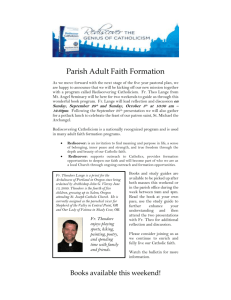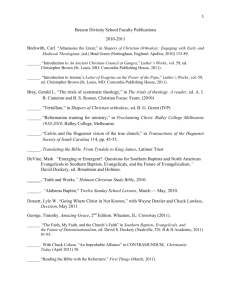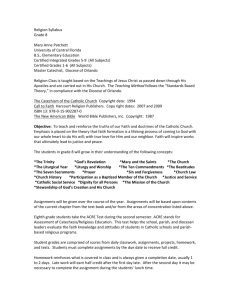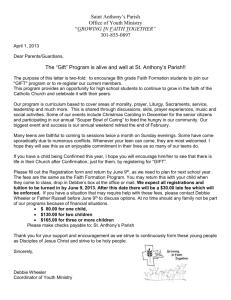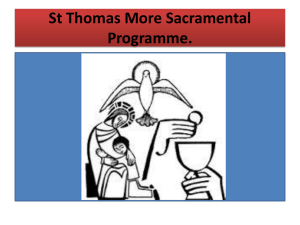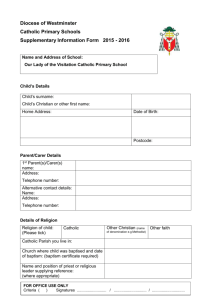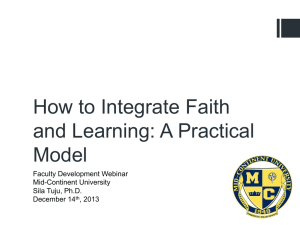Christian Living Theme - St Patrick`s Liverpool
advertisement
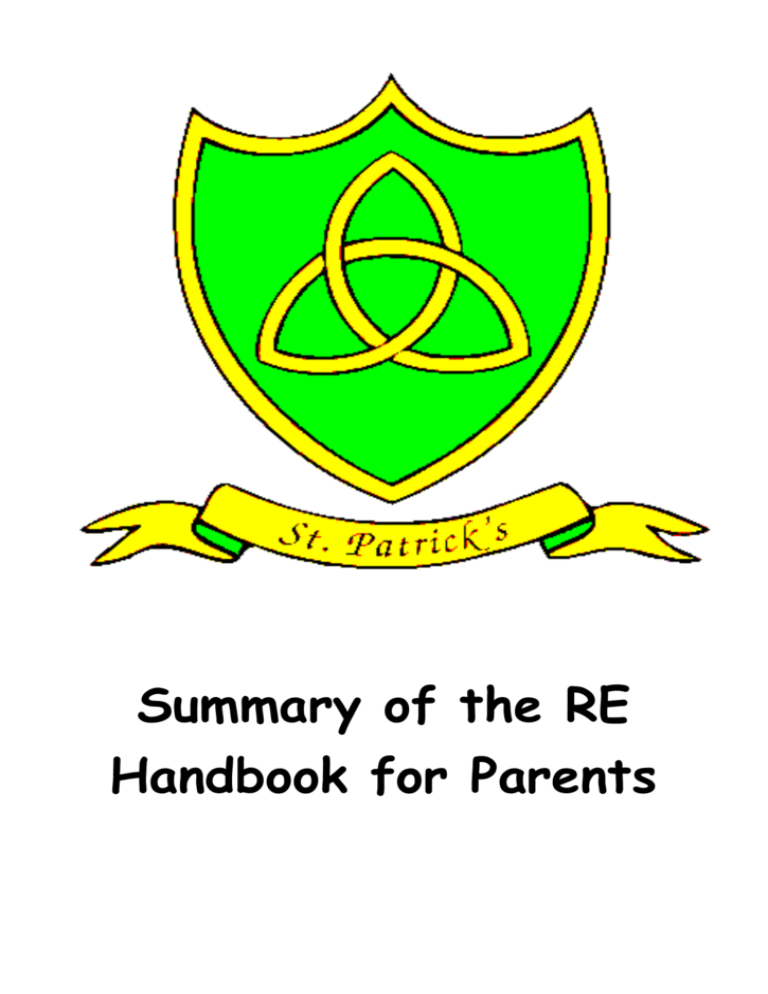
Summary of the RE Handbook for Parents MISSION STATEMENT UNDERSTANDING PEACE LOVE At the heart of everything we think and do at St. Patrick’s are the Christian principles of peace, love and understanding. These principles will help us to show mutual care, respect and forgiveness. We encourage a love of learning and work together to help each individual towards happiness, self-belief, independence and fulfilment. We promote good relationships between home, school, parish and community to the benefit of all. To keep our core principles at the heart of everything we think and do at St. Patrick’s, we: Implement all policies with a special emphasis on R.E. and P.S.H.E. Develop the ethos of the school, fostering self-belief and a respect for others’ beliefs in everything we do. Provide opportunities for spiritual and moral development within a peaceful environment, encouraging thoughtful and meaningful collective worship and reflection. In encouraging a love of learning and working together to help each individual towards happiness, self-belief, independence and fulfilment, we: Provide enriching learning opportunities of the highest quality which enhance pupils’ independence, enabling self-fulfilment. Encourage and support the professional development of all staff. Enhance pupils’ self-belief, self-respect and respect for others through providing positive role models. In promoting good relationships between home, school, parish and community to the benefit of all, we: Involve parents and carers in the life of the school. Support the parish sacramental programmes through meaningful exchanges between home, school and Church. Develop and sustain links with the local and wider community. Aims We aim to develop within our children, a trusting, loving and personal relationship with God by introducing them to the mystery of Christ, through His teachings in the Gospel. This, in turn, should enable the children to have a positive attitude towards themselves and their relationship with others. The aim of R.E. in St. Patrick’s is to provide for the religious and educational needs of all our children. This includes: Children from supportive Catholic homes. Children for whom the school may be their first and perhaps only experience of the Church. Children from other Christian traditions. Children from other faith backgrounds. We aim to ensure that: Children develop in their knowledge and understanding of the mystery of God, Jesus Christ and the Church, and of the central beliefs which Catholics hold. Children develop an awareness of the Catholic faith and an understanding of its impact on personal and social behaviour. Children are brought to an understanding of the Gospel of Jesus Christ and to develop the traditions of our Catholic faith. Positive attitudes towards people of other faiths are encouraged. A sense of awe and wonder is nurtured in the children, so as to give a spiritual dimension to their lives. There is a deepening knowledge and love of Christ within the Sacraments of the Church. Children are given an opportunity to reflect and evaluate on their own attitudes to life and their relationships with others. The liturgical year is reflected in the life and activities of the school. St. Patrick’s school accepts fully the aims and objectives of R.E. as taken from the Religious Education Curriculum Directory (R.E.C.D) The Aims of Religious Education in Catholic Schools Religious Education is about engaging with the deepest questions of life and finding reasons for the hope which is within them (1 Peter 3:15) It is about the Christian vision of the human person It is the core subject which is central to the life of the Catholic school. Religious education is the systematic study: - of the mystery of God, as discovered through the Bible and particularly through the life and teachings of Jesus Christ, - the teachings of the Church, - the lives of the saints, - the relationship between faith and life. For all children religious education is a ‘proper’ subject in its own right in the school's curriculum. It is a rigorous academic discipline, and as such it is to be taught, developed and resourced with the same commitment as any other subject. For those already engaged in the journey of faith, religious education will be catechesis, and for some children and young people, religious education will be evangelisation, the first opportunity to hear the good news of the gospel. Excellence in Religious education will be achieved by: - clarity of succinct religious learning objectives, - key content, - by appropriate methodologies, - rigour, - richness of resources, - achievement of identified outcomes, - accurate methods of assessment. The objectives of curriculum religious education in St Patrick’s School are: to develop knowledge and understanding of the mystery of God and of Jesus Christ, of the Church, and of the central beliefs which Catholics hold; to develop awareness and appreciation of Catholic belief, understanding of its impact on personal and social behaviour and of the vital relationship between faith and life, life and faith; to encourage study, analysis, investigation and reflection by the pupils; to develop appropriate skills: for example, ability to listen; to think critically, spiritually, ethically and theologically; to acquire knowledge and organise it effectively; to make informed judgements; to foster appropriate attitudes: for example, respect for truth; respect for the views of others; awareness of the spiritual, of moral responsibility, of the demands of religious commitment in everyday life and especially the challenge of living in a multicultural, multifaith society. 10% of the length of the taught week for each Key Stage of education to be given to RE teaching and learning. Marked progression through the different stages of education. Teaching and Learning The outcome in religious education is religiously literate young people who have the knowledge, understanding and skills – appropriate to their age and capacity – to reflect spiritually, and think ethically and theologically, and who are aware of the demands of religious commitment in everyday life. (RECD 2012) Religious education will be taught discretely and developmentally. It will include the deepening of knowledge, and understanding of key theological ideas and their application to life. Ample opportunities will be offered for children to apply and use their knowledge and skills in cross-curricular studies to deepen their understanding of religious truths and think creatively. Engagement with their own and others’ beliefs and values will help to develop good attitudes and dispositions so that children are instilled with a love of learning and a desire to go on learning. Engagement with difficult questions of meaning and purpose which everyone has to face will enable them to think critically about their own questions of meaning and purpose. Offer the children a sense of self worth through their experience of belonging to a caring community and an awareness of the demands of religious commitment in everyday life. The Religious Education Programme To fulfill our aims and objectives we use the ‘Come and See’ programme of Religious Education recommended by the Archdiocese of Liverpool. Central to the programme are three basic human questions and the three Christian beliefs that are the Church's response to faith. Where do I come from? Life - Creation Who am I? Dignity - Incarnation Why am I here? Purpose - Redemption These three doctrines of Christianity express faith in God as Trinity: Creator, Saviour, Spirit, and personal: Father, Son and Holy Spirit: the Holy One whose love gives life to all (creation): who makes all holy (incarnation) and whose purpose is to draw all men and women into one, universal family of God (redemption) At the heart of the diagram is the Chi-rho, the symbol of Jesus Christ. He is the complete revelation of God. Note: to emphasise the relationship of life and faith, Come and See uses the symbol to link universal and Christian language throughout. The Theology of the Year. Autumn In the Autumn term we consider God the Father, and the question, ‘Where do I come from?’ – Life and Creation through the: Church theme: Domestic Church – Family Sacramental Theme: Belonging – Baptism/Confirmation and the Christian Living Theme: Advent Christmas – Loving Spring In the Spring term we consider God the Son, and the question, ‘Who am I?’ – Dignity and Incarnation through the: Church theme: Local Church - Community Sacramental Theme: Relating - Eucharist and the Christian Living Theme: Giving – Lent/Easter. Summer In the Summer term we consider God the Holy Spirit, and the question, ‘Why am I here?’ – Purpose and Redemption through the: Christian Living Theme: Pentecost – Serving. Sacramental Theme: Inter-Relating - Reconciliation and the Church theme: Universal Church - World Each year group explores each theme through different topics. (See appendix 1) These topics take account of the ages and stages of development of pupils in the primary years. The content is so structured that there is cohesion and progression in what children do and learn. For each level, there are clearly stated learning outcomes, achievable learning objectives and a variety of experiences and activities for each of the learning objectives. These allow teachers to select what is appropriate for the class or groups of pupils according to their different abilities. The Process Skills and Attitudes Process In answer to the questions, the Catechism addresses the human search for meaning, God's initiative in Revelation and the response of faith. This pattern informs the three-fold process, Explore, Reveal and Respond, through which this programme is delivered. It is necessary that Religious Education in schools be regarded as an academic discipline with the same systematic demands and the same rigour as other disciplines. It must present the Christian message and the Christian event with the same seriousness and the same depth with which other disciplines present their knowledge. However, it should not simply be regarded as one subject among many, but rather it should engage in interdisciplinary dialogue……. Religious Education in schools underpins, activates, develops and completes the educational catechetical activity of the whole school. RECD 2012 The Word who is life – This is our subject SEARCH- EXPLORE This is the introduction to the topic where the children’s life experience is explored, the question(s) it raises are wondered at, shared, investigated and their significance reflected upon. REVELATION – REVEAL This is the heart of the programme where knowledge and understanding of the Catholic faith is revealed through the Word, in Scripture, Tradition, doctrine, prayers, rites and Christian living. RESPONSE – RESPOND This is where the learning is assimilated, celebrated and responded to in daily life. Explore (One Week) The teacher helps the children to begin to look at and focus on an aspect of life experience - concerning themselves, their relationships, their world - in order that they acknowledge and become aware of it. In this way, children are led to a deeper understanding, clearer vision and the discovery of significance and value of the experiential events of everyday life. This will involve: Exploring experiences through story, music, drama, dance, art, etc. Investigation Story telling Consideration of the big questions Discussion Becoming aware of the questions raised Reflecting on the significance of these experiences. Reveal (Two Weeks) This is the heart of the process - the presentation of the Christian understanding of life experience. The teacher and the children together discover the Christian understanding of the mystery of the Trinity: Father, Son and Holy Spirit. They explore the mystery of human life as revealed in the person, life and gospel of Jesus Christ.It will involve learning about scripture, the teaching of the Church, prayers, rites, psalms, hymns, and other expressions of Christian faith and the lives of outstanding Christians. This is done by: meeting new knowledge of religious education; developing an understanding of this new knowledge; reflecting on the wonder of the mystery; gathering information and collecting facts connected with this knowledge; researching, collating and classifying becoming aware of the questions raised; working with problems and grappling with puzzling experiences; exploring experiences through story, music, drama, dance, art; exploring what leads to understanding and meaning; asking questions and discussing; exploring in creative and practical ways through drama, writing, poetry, song, dance, music ICT and service of others; making links between Christian understanding and the shared life experience; valuing life experience; acknowledging and respecting difference(s) being open to new perspectives. Respond (One Week) Remember The teacher enables the children to recall, review and celebrate the work done in the topic. This part begins by reflecting on what the children wonder about. This is followed by providing the opportunity for the children to remember what they have understood and learnt. This may be done through: creating a quiet, prayerful atmosphere for reflection looking and thinking about the work done drawing attention to different aspects of this work sharing thoughts and feelings. Rejoice The teacher and children together celebrate in worship all that has been done and learned. The celebration will usually take the form of Gather – How will the children begin their celebration? Listen – to some scripture Response – How will the children respond to what they have heard? Going Forth - How will the children take away the message? Renew The teacher helps the children to make and individual response, to hold on to, and make their own, what they have understood of their own experience and of the experience of the Church community. Older children may be offered the opportunity to write or draw in their personal notebooks. The themes and topics for each year group are as follows. The Global dimension The development of a social conscience is an integral part of religious education. Catholic teaching identifies this as ‘seeking the common good’. (CCC, The common Good) CAFOD, (Catholic Agency for Overseas Development) works with schools and supports them in this aspect of religious education through up-to-date material. This is focused for different age groups through its fairground magazines, website (www.cafod.org.uk) and in-service provision. Other Faiths In the autumn term one week is given to the exploration of Judaism or Islam, and in the Summer term, whichever is longer, the other faith is covered. Other Faith Topics are supported by visiting speakers as well as visits to the Mosque and Synagogue. Work arising from the study of Other Faiths is, where possible, drawn together by a whole school celebration where each class contributes aspects of their own area of learning. Vatican II was a major step forward in openness of attitude and relationships with believers of other faiths. Catholics are called to be committed to respecting people of other faiths and to recognise that God is at work in them. In the multi-faith society of today, RE should introduce children to the background and beliefs of people of other faiths so that prejudice and misunderstanding can be overcome from an early age. A recommended approach and teaching materials for other faiths is provided for each year group in the Come and See programme. Stages of development From their experience, teachers know that there may be a range of stages of development of children of the same age. Some general aspects of development can, however, be identified. Ages 3 – 7 For these children, significant people in their lives are central. The ‘ person’ is the message. The focus for religious education is on: - Naming – without explaining – religious people, actions, feelings, objects - Imitating the words, actions, feelings of significant adults. - Belonging by joining in. Ages 7 – 11 For these children, the Tradition becomes central. Story, told in a variety of ways, carries the message. The focus for religious education is on - Behaviour of religious people, what they say, feel, do. - Research, collecting facts, exploring questions, discovering answers, memorising. - Joining in and belonging in a more conscious way. Learning and Teaching Styles In St. Patrick’s School, Religious Education is delivered in a variety of ways. (See also Curriculum Policy). Staff choose the appropriate method of delivering the topics this involves: whole class teaching group work individual work visits/visitors providing relevant experiences the use of resources such as artefacts, videos, films, photos etc. involvement of parents/community. ICT Role play Hot seating We accept that children learn in many different ways and from many sources and we seek to provide as many and as varied experiences as possible in order to widen and develop their understanding. Relationship of R.E. to the Whole Curriculum Collective Worship Spiritual & Moral Development See separate Policy See separate Policy From our Mission Statement we encourage all our children in their development to their full potential and this includes spiritual and moral development. This can be identified in all our work in school but most of all in the relationships which exist within the school. In policies such as Behaviour, Bullying, Equal Opportunities, S.E.N, Inclusion. In work done in R.E., Health Education, Education and Personal Relationships and Assemblies. We firmly believe that the Christian perspective should permeate the entire school curriculum and can thus enable children to develop the moral and spiritual dimensions of life. We seek to recognise, affirm and celebrate the gifts and talents of all children and staff. Relationships and Sex Education - See separate Policy Away Days and Retreats Infant children are provided with many visits to widen their experience and to allow them opportunities to see the world of nature (i.e. park visits). There are various residentials offered which create opportunities for awe and wonder. Other visits are undertaken to look at specific topics which are also relevant to their religious education. These include - Spring/Autumn visits, visits to farms, animal enclosures, homes, beach etc. Junior children are provide with a wide experience of curriculum visits but also include residential visits. These visits provide an opportunity for reflection and personal development. We plan carefully the worship aspect of these visits. Links with Parents/Guardians Parents are invited into school each term to meet their child's teacher and discuss their work and progress. An annual report is sent home in the summer term. Each term a curriculum plan is sent home, which gives specific information about the topics to be studied each term and how the parents can support their child’s learning. Meetings are held with Foundation Stage parents to welcome and introduce them to the school, at these meetings R.E. is discussed. Parents are invited to any and all assemblies held in school. In Particular they are invited to Show and Tell Assemblies, and to Whole School Liturgies, Assemblies and Celebrations. Parents are sent a letter each term containing information about the term’s “Come and See” topics for their child for that term. Staff offer support and counselling where necessary. Parents of pupils with Special Educational Needs are regularly invited into school to discuss their child's needs. Copies of the schools policies for Bullying and Behaviour, Equalities and Anti-Racism are available for parents. Parents of Year 4 children are invited to church for sacramental preparation. We operate a Child Protection Policy known to parents. We also invite parents into school to hear about the schools Education in Personal Relationships Policy. Our aim is to welcome and involve parents in all areas of their child's school life. Rainbows for all God’s children is held in response to need. There is a school council in place. Sacramental Preparation & Parish Links Preparation for the Sacraments of Family Reconciliation, Confirmation and Eucharist are in integral part of "Come and See". Work begun in the Reception class is deepened and developed throughout Infant and Junior years. In school, Year 4 is the year of Celebration and the Parish invite parents to take part in preparation. The Parish Priest, alongside school staff, provides families with opportunities and support to help them continue their child’s faith journey. School is involved in the preparation and delivery of Family Catechesis sessions and works closely with the parish to do this. If parents need any more information about RE in school then please do not hesitate to contact the RE co-ordinator, Mrs. Lewis. 18 19

